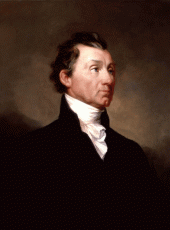
Proclamation 32—Declaring the Ports of the United States to be Open to Vessels of Great Britain
By the President of the United States of America
A Proclamation
Whereas by an act of the Congress of the United States passed on the 6th day of May last it was provided that on satisfactory evidence being given to the President of the United States that the ports in the islands or colonies in the West Indies under the dominion of Great Britain have been opened to the vessels of the United States the President should be, and thereby was, authorized to issue his proclamation declaring that the ports of the United States should thereafter be open to the vessels of Great Britain employed in the trade and intercourse between the United States and such islands or colonies, subject to such reciprocal rules and restrictions as the President of the United States might by such proclamation make and publish, anything in the laws entitled "An act concerning navigation" or an act entitled "An act supplementary to an act concerning navigation" to the contrary notwithstanding; and
Whereas satisfactory evidence has been given to the President of the United States that the ports hereinafter named in the islands or colonies in the West Indies under the dominion of Great Britain have been opened to the vessels of the United States; that is to say, the ports of Kingston, Savannah le Mar, Montego Bay, Santa Lucia, Antonio, St. Ann, Falmouth, Maria, Morant Bay, in Jamaica; St. George, Grenada; Roseau, Dominica; St. Johns, Antigua; San Josef, Trinidad; Scarborough, Tobago; Road Harbour, Tortola; Nassau, New Providence; Pittstown, Crooked Island; Kingston, St. Vincent; Port St. George and Port Hamilton, Bermuda; any port where there is a custom-house, Bahamas; Bridgetown, Barbadoes; St. Johns, St. Andrews, New Brunswick; Halifax, Nova Scotia; Quebec, Canada; St. Johns, Newfoundland; Georgetown, Demerara; New Amsterdam, Berbice; Castries, St. Lucia; Besseterre, St. Kitts; Charlestown, Nevis; and Plymouth, Montserrat:
Now, therefore, I, James Monroe, President of the United States of America, do hereby declare and proclaim that the ports of the United States shall hereafter, and until the end of the next session of the Congress of the United States, be open to the vessels of Great Britain employed in the trade and intercourse between the United States and the islands and colonies hereinbefore named, anything in the laws entitled "An act concerning navigation" or an act entitled "An act supplementary to an act concerning navigation" to the contrary notwithstanding, under the following reciprocal rules and restrictions, namely:
To vessels of Great Britain, bona fide British built, owned and the master and three-fourths of the mariners of which at least shall belong to Great Britain, or any United States built ship or vessel which has been sold to and become the property of British subjects, such ship or vessel being also navigated with a master and three-fourths of the mariners at least belonging to Great Britain: And provided always, That no articles shall be imported into the United States in any such British ship or vessel other than articles of the growth, produce, or manufacture of the British islands and colonies in the West Indies when imported in British vessels coming from any such island or colony, and articles of the growth, produce, or manufacture of the British colonies in North America or of the island of Newfoundland in vessels coming from the port of St. Johns, in that island, or from any of the aforesaid ports of the British colonies in North America.
Given under my hand, at the city of Washington, this 24th day of August, A. D. 1822, and in the forty-seventh year of the Independence of the United States.
JAMES MONROE.
By the President:
JOHN QUINCY ADAMS, Secretary of State.
James Monroe, Proclamation 32—Declaring the Ports of the United States to be Open to Vessels of Great Britain Online by Gerhard Peters and John T. Woolley, The American Presidency Project https://www.presidency.ucsb.edu/node/208030
